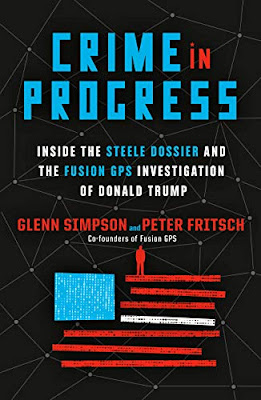=======
Christopher Steele's Dossier became available to the public in January 2017 -- four months before the establishment of Robert Mueller's Special Counsel investigation. For sure, Mueller's staff intended to investigate the Dossier's story about Michael Cohen meeting secretly with Kremlin officials in Prague.
According to staff lawyer Andrew Weissmann, however, that intended investigation of Cohen was delayed because Weissmann very soon received from another lawyer a tip that a Russian "oligarch" (Viktor Vekselberg) had deposited money into an account that Cohen had used to pay to silence two former female lovers of Donald Trump. According to Weissmann, Mueller feared that this sexual aspect of the Cohen investigation might cause a public uproar, as the Monica Lewinsky aspect had done in the earlier Special Counsel investigation of President Bill Clinton. Therefore, Mueller decided to turn the initial investigation of Cohen over to the FBI's Southern District of New York (SDNY).
Mueller and his staff expected the SDNY to implicate Cohen in some process crimes, a situation that eventually would enable that staff to pressure Cohen to confess his secret knowledge of the imaginary Trump-Putin collusion to accomplish an October Surprise that would enable Trump to win unfairly the USA's 2016 Presidential election.
The raid on Cohen's home, hotel room and law office in April 2018 was carried out by the SDNY, without the Special Counsel's involvement.
Of course, the SDNY easily did implicate Cohen in various process crimes and then turn him back over to be Special Counsel staff to be pressured into confessing, but then Cohen was not able to reveal any such knowledge. After all, the collusion always had been just imaginary.
=======
When Weissmann had been informed about Russian "oligarch" Vekselberg depositing money into Cohen's account that was used to pay hush-money to Trump's alleged lovers, Weissmann surely assumed this arrangement as a key part of the imaginary collusion where Russians secretly had helped Trump win the election. However, the Mueller Report does not say anything about that situation where Vekselberg's money and the hush money were passing through Cohen's bank account. Therefore we should deduce that Mueller's staff was not able to connect "oligarch" Vekselverg's money to any such collusion.
Also, the Mueller Report does not write anything along the lines that:
* the Special Counsel offered Cohen legal leniency for his process crimes in exchange for his secret knowledge about the Trump-Putin collusion,
* but Cohen responded that he did not know anything about any such collusion and furthermore perceived the FBI's collusion delusion to be preposterous.
=======
The FBI had interviewed Steele's "primary sub-source" Igor Danchenko already in January 2017 and so knew that the "Kremlin insider" who told the yarn about Cohen in Prague was Danchenko's former school-mate Olga Galkina, who was living in Cyprus. Therefore, the Mueller Report ignored that yarn except for three sentences stating simply that Cohen had not gone to Prague. The Report does not explain the FBI's certainty about this point.
=======
In regard to Cohen, the Mueller Report's main idea is to insinuate that there was something sinister about proposals to develop a Trump Hotel in Moscow. The insinuation was that Putin was helping Trump to develop that hotel project as one part of a larger collusion to help Trump win the 2016 election by devious methods. The FBI's idea -- reinforced by the Dossier -- seems to be that Putin's secret help on the hotel project would compromise Trump and so allow Putin to blackmail and extort Trump.
At that time, the Trump Organization had developed six Trump Hotels in the USA, two in Scotland and one in Ireland. On one hand, developing Trump Hotels was not a new activity, but on the other hand, a Trump Hotel in Moscow would be in a novel location and environment.
Indeed, Cohen was involved in some talk about the proposed Moscow hotel, but nothing significant happened. No site was selected, no financing was provided, no Russian partners were recruited, no business trips were done, and no contracts were signed. The main promoter of the project was Felix Sater, a Russian immigrant who lived in the USA and dabbled in real estate.
The Special Counsel indicted Cohen for stating publicly that the project essentially had ended in January 2016, whereas some trivial conversations had happened as late as June 2016. Cohen wrote in his book that he pleaded guilty to all the charges -- no matter how absurd -- just to prevent an indictment of his wife for evading taxes. He had turned against Trump and was happy to incriminate Trump in any wrong-doing, but Cohen simply did not know anything about the imaginary election collusion.
If Cohen had gone to trial on the charge that he had not mentioned the June 2016 conversations about the hotel project, then the prosecutors would have had to prove that this omission was material to the FBI's investigations. If the FBI had been told earlier about the June 2016, then nothing would have changed in the FBI investigations. The FBI never had to prove the materiality, however, because Cohen pleaded guilty and did not go to trial.
========
This blog article is the end of my series titled "The FBI's Abuse of Michael Cohen". However, I intend to write another series summarizing my current speculations about the Prague-meeting yarn.


